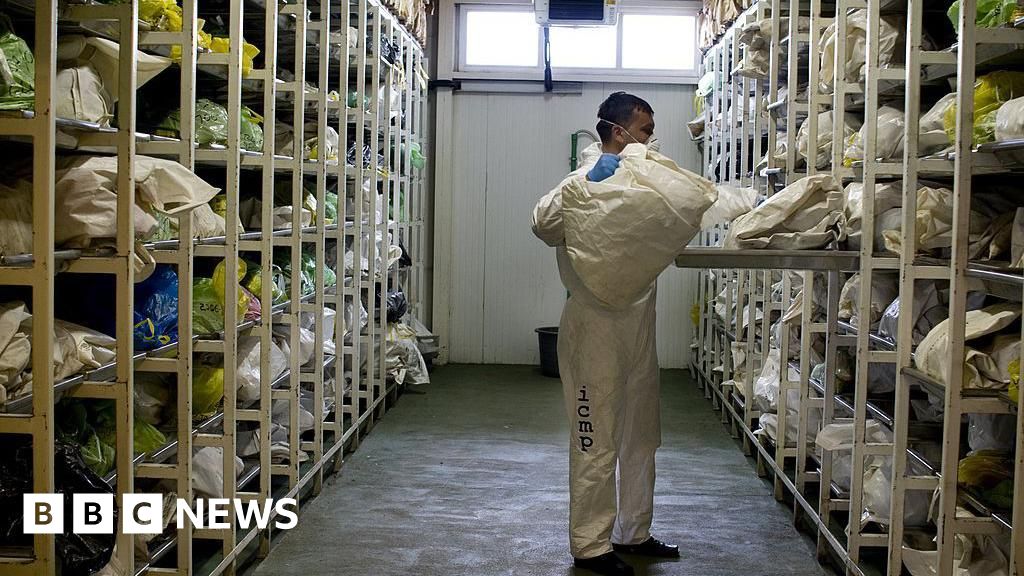The ICMP’s main mission is to identify and bury victims of wars and natural disasters across the world
How do you tell a family who lost someone to genocide that they may have buried the wrong body?
That is the extremely delicate challenge facing missing persons organisations in Bosnia and Herzegovina.
They are trying to trace around 7,000 people who still have not been found, almost 30 years on from the end of the Bosnian war, which lasted from 1992-95.
Meanwhile, the remains of almost 2,000 people are lying unidentified in the country’s mortuaries.
The obvious conclusion would be that some of the missing might be found in these locations.
But another agonising possibility is that no relatives have claimed the bodies because they believe they have already buried their family members.
“Between 1992 and 2001, 8,000 cases were identified without the use of DNA,” says Matthew Holliday, the Programme Director in Europe for the International Commission on Missing Persons (ICMP).
Human remains at Visoko mortuary
He says that while the vast majority were correct, “there is an element of risk if you don’t use dental records, fingerprints or DNA. Misidentification can be between 15 and 20%. So it’s a sizeable issue”.
The ICMP has been at the vanguard of efforts to find and identify the remains of victims since its foundation in 1996. Its pioneering DNA lab started work in Sarajevo in 2001.
Now it is part of a new drive in Bosnia to obtain blood tests from the family members of missing people. That includes some of those whose cases were previously declared resolved.
“It’s important to reach out to families and get a reference sample, to exclude the possibility that their relative might be in a mortuary,” says Mr Holliday.
“We talk and walk them through the process. The key thing is, if you provide blood, you may actually find that your relative is on a rack in a mortuary. Wouldn’t you rather find that out?”
The missing still include around 800 victims of the 1995 Srebrenica Massacre, when Bosnian-Serb forces systematically murdered more than 8,000 Bosniak Muslim men and boys.
Mirela was born two years after her brothers disappeared
Every summer, a few more victims are laid to rest, thanks to the work of the ICMP and its partners, including Bosnia’s Missing Persons Institute. This year, 14 people were buried in a ceremony at Potocari Cemetery – close to Srebrenica.
That can make an enormous difference to the relatives of those who died.
“It’s hard not to have a place where you can pay tribute to your loved ones,” says Mirela Osmanovic, who works at the Srebrenica Memorial Centre.
Her two teenage brothers, Velid and Ahmedin, both died in the massacre two years before she was born.
“Thankfully, we found their bodies,” she says, “and we buried them at the Memorial Centre in Srebrenica. But finding their bones and accepting what had happened was a really long process.”
Mirela never knew her brothers, though she has heard tales about them from her family. And she was keenly aware of the anguish, mixed with hope, that her parents felt in the decade before their sons’ bodies were found and identified.
She says the moment marked the closure of a painful chapter of their lives, because until then they were hoping someone would knock on the door and say her brothers were alive.
“They were buried in 2006 and 2008. That was actually quite early. Even 30 years after the genocide, there are families who have not found their loved ones,” says Mirela.
Zekija Avdibegovic is from such a family. She chairs the missing persons association in the town of Ilijas, near Sarajevo.
More than 30 years on from their disappearance, she’s still hoping for news of her husband, son and seven other family members.
The ICMP is running blood sampling initiatives
“Honestly, it’s an extremely difficult process,” she tells me. “We were two young people trying to build a house and bring up a family. Now the purpose of our lives is just to learn about our loved ones’ fates and bury them”.
Zekija hopes the latest drive for blood tests may bring some answers and what she calls relief.
“I am aware that they were killed,” she says of her family members. “But knowing someone knows where their bodies are troubles me. With no grave to visit, it’s difficult. It adds to my grief.”
Time is another element. Zekija points out that in an increasing number of cases, there may be no suitable living relatives to provide blood samples.
The ICMP’s Matthew Holliday notes that there is no time limit to the work of either his organisation or the Missing Persons Institute. And he acknowledges that while “some people will never be found, with additional effort, we can still find many more”.
If the blood sample drive produces results, some bereaved families may finally be able to bury the misidentified remains of their relatives. And some of the mystery remains in the mortuaries may be identified at last.
Checkout latest world news below links :
World News || Latest News || U.S. News
The post Blood tests help Bosnian families find closure after war appeared first on WorldNewsEra.

